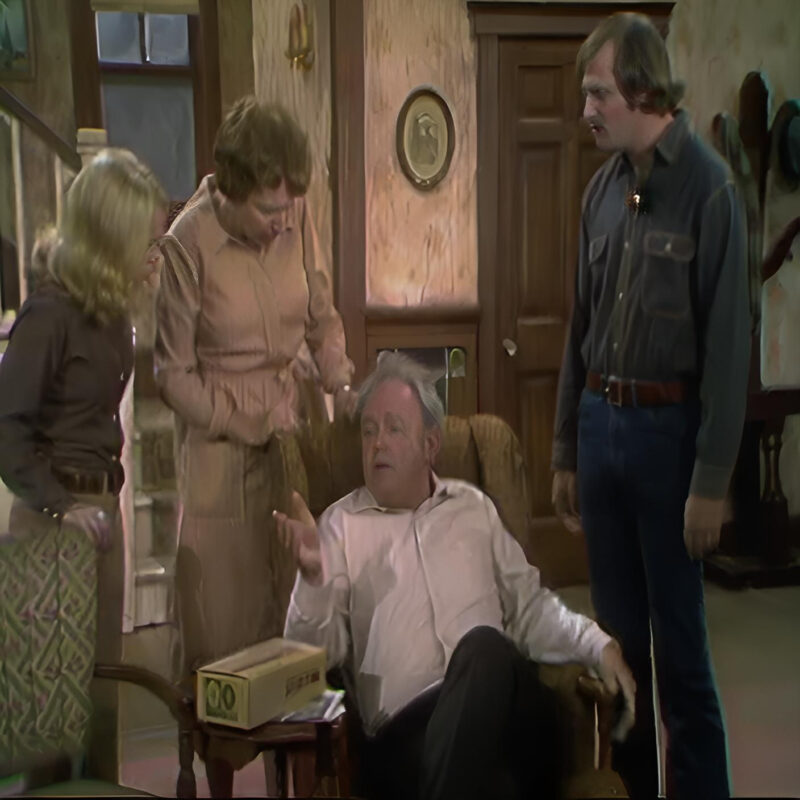
To television audiences, Carroll O’Connor and Archie Bunker are almost inseparable, at least visually. Yet, beyond the familiar living room of the Bunkers in Queens, New York, Carroll O’Connor led a life far removed from his famous character in “All in the Family.”
In a 1972 interview, O’Connor confessed, “I had no ambition to be an actor. I wanted to have a permanent job as a professor of European history at some university. I thought on the side I’d write a historical novel or two.” This academic aspiration followed his rejection by the United States Navy during World War II, leading him to join the U.S. Merchant Marines. After the war, he sought education like “all good middle-class American boys,” enrolling at the University of Montana.
A Significant Turning Point
Born on August 2, 1924, in New York City, O’Connor’s time at the University of Montana proved transformative. He edited the student newspaper, The Montana Kaimin, met his future wife, Nancy Fields, and discovered a passion for acting through the school’s troupe, The Masquers.
In 1949, the Great Falls Tribune praised O’Connor’s performance in Maxwell Anderson’s “Winterset,” noting his transition from minor roles to a skilled character actor. That same year, The Missoulian highlighted his role in “Our Town,” forecasting the stardom that lay ahead.
Early Acting Days and Education
O’Connor left Montana to support his younger brother’s education, enrolling at University College Dublin in Ireland. There, he studied English literature and Irish history, while Nancy graduated and joined him. They married in Ireland and returned to Montana in 1955, where O’Connor earned a master’s degree in speech.
By December 1955, The Missoulian reported on O’Connor’s cultural engagement, detailing his and Nancy’s talk on “The Irish of It All” and his powerful portrayal of Othello. His dedication to both his heritage and craft was evident.
The Writer’s Path
In 1956, O’Connor’s play “A Seraph Intercedes,” about Irish anti-partitionists, was staged. He continued to direct and write, showing versatility beyond acting. In 1958, he caught the attention of Burgess Meredith, who cast him in the off-Broadway production of “Ulysses in Nighttown” alongside Zero Mostel, propelling his career.
O’Connor’s film career began with an uncredited role in “The Defiant Ones” (1958), followed by notable films like “Cleopatra” (1963) and “Kelly’s Heroes” (1970). On television, he appeared in numerous shows, including “The Untouchables,” “Bonanza,” and “The Fugitive.”
Enter Norman Lear and Archie Bunker
O’Connor’s role in “What Did You Do in the War, Daddy?” caught the eye of Norman Lear, who was adapting the British sitcom “Till Death Us Do Part” for American audiences. Lear saw O’Connor as the perfect Archie Bunker, despite having based the character on his own father.
Lear recalled, “Carroll and I didn’t always agree about the scripts, but let me say that I worshipped the ground he walked on. He was Archie Bunker. When I read him for the role, I can’t tell you what I had in mind for that character. All I can tell you is that Carroll O’Connor, the minute he read those lines, that’s who Archie Bunker was.”
O’Connor understood Archie’s complex nature, remarking, “You have to remember, Archie is a victim, too. Of his own education and background. His thinking was shaped at an early age when he was inculcated with bigotry. He got it from his parents.”
Legacy of a Television Icon
Carroll O’Connor’s portrayal of Archie Bunker left an indelible mark on television history. His journey from aspiring professor to celebrated actor demonstrates the power of dedication, versatility, and an unyielding commitment to one’s craft. Through “All in the Family,” O’Connor and Lear created a character that resonated deeply with audiences, making Archie Bunker a timeless symbol of American television.
